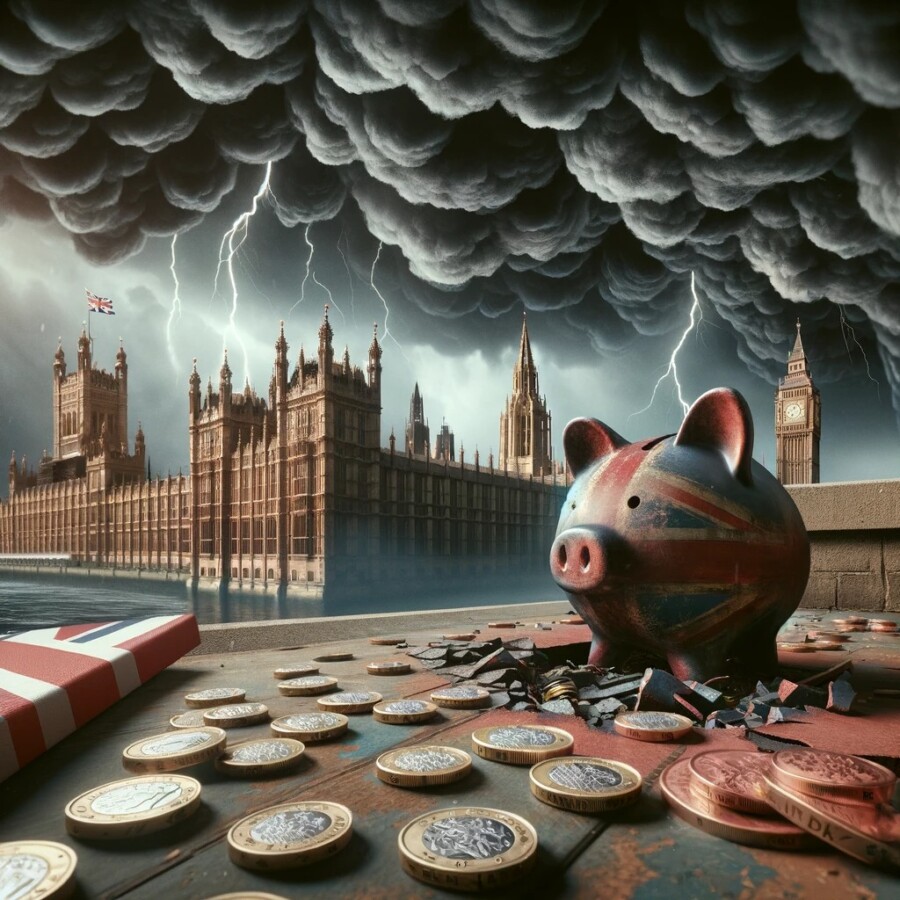The UK’s competition watchdog, the Competition & Markets Authority (CMA), has found that popular food brands have been raising prices more than their costs over the past two years. This means that products like baby formula, baked beans, and pet food have become more expensive. About three-quarters of the companies that make these brands have been making more money on each product. The main reasons for the higher prices are the rising costs of energy and fertilizer. However, the CMA found that food companies have been increasing prices more than they need to, which has contributed to the overall increase in food prices. As a result, people have been buying cheaper store-brand products instead of the branded ones, which has caused the branded products to lose popularity and money.
One area that the CMA is worried about is the baby formula market. The prices of baby formula have gone up by 25% in the past two years. The market is mostly controlled by two big companies, Danone and Nestle, and there isn’t much evidence of parents choosing cheaper options. The CMA is concerned that parents might not have enough information to make smart choices and that the companies might not have a good reason to offer lower prices. However, a nutritionist and author said that there isn’t much difference in nutrition between the branded and unbranded baby products because of strict UK rules.
Some parents, like Gemma Maxwell from Glasgow, have started thinking about trying different brands after realizing that the nutritional value of different formulas is the same. But others, like Diane Phillips from Staffordshire, still prefer the bigger brands because of their reputation. The British Retail Consortium says that families can save a lot of money by switching to cheaper brands or store-brand products that still have all the nutrition a baby needs to be healthy.
The CMA will keep investigating the baby formula market and supermarket loyalty card programs. Some supermarkets offer lower prices only to customers with loyalty cards, and the CMA will look into this in 2024. The watchdog wants to make sure that everyone can get discounts on important household products and that the promotions are clear and easy to understand. In September, a consumer group called Which? warned that loyalty card programs might not be as good as they seem, because supermarkets might raise prices to make the discounts look bigger. But both Tesco and Sainsbury’s said that this isn’t true.
The CMA has the power to make sure companies follow the rules and can work with them to fix any problems. If needed, it can make companies change the way they do business and even make them pay fines.
Original news source: Shoppers hit by escalating prices of branded goods (BBC)
Listen
Slow
Normal
Fast
Group or Classroom Activities
Warm-up Activities:
– News Summary
Instructions: Divide the class into small groups. Each group will read the article and summarize it in their own words. They should focus on the main points and key information. After a designated amount of time, each group will share their summaries with the class.
– Opinion Poll
Instructions: Have the class work in pairs or small groups. Each group will come up with a question related to the article, such as “Do you think food companies should be allowed to raise prices more than their costs?” Each group will then conduct an opinion poll by asking other classmates the question and recording their responses. Afterward, the groups can present their findings to the class.
– Vocabulary Pictionary
Instructions: Write down key vocabulary words from the article on separate pieces of paper. Divide the class into two teams. Each team will take turns choosing a word and drawing a picture to represent it, while the other team tries to guess the word. The team with the most correct guesses wins.
– Synonym Challenge
Instructions: Provide the class with a list of words from the article. In pairs or small groups, students will work together to come up with as many synonyms as possible for each word. After a designated amount of time, groups can share their lists with the class and compare their answers.
– Think-Pair-Share
Instructions: After reading the article, have students think individually about their own opinions on the topic. Then, pair them up with a partner to discuss their thoughts and reasons behind their opinions. Finally, have each pair share their opinions with the rest of the class, allowing for a class-wide discussion on the topic.
Comprehension Questions:
1. What has the UK’s competition watchdog found about popular food brands?
2. Why have products like baby formula, baked beans, and pet food become more expensive?
3. How have rising costs of energy and fertilizer contributed to the overall increase in food prices?
4. What has been the result of people buying cheaper store-brand products instead of branded ones?
5. What is the CMA concerned about in the baby formula market?
6. Why do some parents still prefer the bigger brands of baby formula?
7. What does the British Retail Consortium suggest families do to save money on baby formula?
8. What will the CMA be investigating in 2024?
Go to answers ⇩
Listen and Fill in the Gaps:
The UK’s competition watchdog, the Competition & Markets Authority (CMA), has found that popular food brands have been raising prices more than their costs over the past two years. This means that products like baby formula, baked beans, and pet food have (1)______ more expensive. About three-quarters of the companies that make these brands have been making more money on each product. The main reasons for the higher prices are the rising costs of energy and (2)______. However, the CMA found that food companies have been increasing prices more than they need to, which has (3)______ to the overall increase in food prices. As a result, people have been (4)______ cheaper store-brand (5)______ instead of the (6)______ ones, which has caused the branded products to lose popularity and money.
One area that the CMA is worried about is the baby formula market. The prices of baby formula have gone up by 25% in the past two years. The market is mostly controlled by two big companies, Danone and Nestle, and there isn’t much evidence of parents choosing cheaper options. The CMA is (7)______ that parents might not have enough information to make smart choices and that the companies might not have a good reason to offer lower prices. However, a nutritionist and (8)______ said that there isn’t much difference in nutrition between the branded and unbranded baby products because of strict UK rules.
Some parents, like Gemma Maxwell from Glasgow, have started thinking about trying (9)______ brands after realizing that the nutritional value of different formulas is the same. But others, like Diane Phillips from Staffordshire, still prefer the bigger brands because of their (10)______. The British Retail Consortium says that (11)______ can save a lot of money by switching to cheaper brands or store-brand products that still have all the nutrition a baby needs to be healthy.
The CMA will keep investigating the baby formula market and supermarket (12)______ card programs. Some supermarkets offer lower prices only to customers with loyalty cards, and the CMA will look into this in 2024. The watchdog wants to make sure that everyone can get discounts on (13)______ household products and that the (14)______ are clear and easy to (15)______. In September, a consumer group called Which? warned that loyalty card programs might not be as good as they seem, because supermarkets might raise prices to make the discounts look bigger. But both Tesco and Sainsbury’s said that this isn’t true.
The CMA has the power to make sure companies (16)______ the rules and can work with them to fix any problems. If needed, it can make companies change the way they do business and even make them pay fines.
Go to answers ⇩
Discussion Questions:
Students can ask a partner these questions, or discuss them as a group.
1. What is the Competition & Markets Authority (CMA) in the UK?
2. How would you feel if the prices of your favorite food brands increased more than their costs?
3. Do you like buying store-brand products or branded products? Why or why not?
4. What do you think about companies raising prices more than they need to?
5. How do you think rising costs of energy and fertilizer affect food prices?
6. Why do you think people are choosing cheaper store-brand products instead of branded ones?
7. What is the baby formula market and why is the CMA worried about it?
8. How would you feel if you found out that there isn’t much difference in nutrition between branded and unbranded baby products?
9. Do you think parents should have more information to make smart choices about baby formula? Why or why not?
10. Why do you think some parents still prefer bigger brands even if the nutritional value is the same?
11. How much money do you think families can save by switching to cheaper brands or store-brand products?
12. What are supermarket loyalty card programs and why is the CMA investigating them?
13. Do you think loyalty card programs are as good as they seem? Why or why not?
14. How do you think supermarkets might raise prices to make discounts look bigger?
15. What do you think the CMA can do to make companies follow the rules and fix any problems?
Individual Activities
Vocabulary Meanings:
Match each word to its meaning.
Words:
1. competition
2. prices
3. brands
4. expensive
5. companies
6. cheaper
7. nutrition
8. discounts
Meanings:
(a) A situation where businesses try to be better than each other
(b) The amount of money you have to pay for something
(c) The substances in food that help you stay healthy
(d) Costing a lot of money
(e) A reduction in the price of something
(f) Costing less money
(g) Businesses that make and sell products
(h) Different types of products made by the same company
Go to answers ⇩
Multiple Choice Questions:
1. According to the Competition & Markets Authority (CMA), why have popular food brands been raising prices?
(a) Rising costs of energy and fertilizer
(b) Decreasing costs of energy and fertilizer
(c) Decreasing demand for their products
(d) Decreasing profits from their products
2. What has been the result of the increase in prices of branded food products?
(a) People have been buying more expensive store-brand products
(b) People have been buying cheaper store-brand products
(c) People have been buying more branded products
(d) People have stopped buying food products altogether
3. Which market is the CMA particularly concerned about?
(a) Pet food market
(b) Baked beans market
(c) Energy market
(d) Baby formula market
4. Why are the prices of baby formula a concern for the CMA?
(a) Parents might not have enough information to make smart choices
(b) There isn’t much difference in nutrition between branded and unbranded baby products
(c) The prices have gone up by 25% in the past two years
(d) All of the above
5. According to the article, why do some parents still prefer bigger brands of baby formula?
(a) Lower prices of the bigger brands
(b) Higher nutritional value of the bigger brands
(c) Reputation of the brands
(d) Lack of availability of cheaper brands
6. What will the CMA investigate in 2024?
(a) Energy and fertilizer costs
(b) Supermarket loyalty card programs
(c) Baby formula market
(d) Food prices in general
7. What did a consumer group called Which? warn about loyalty card programs?
(a) Supermarkets might raise prices to make the discounts look bigger
(b) Supermarkets might lower prices to make the discounts look bigger
(c) Supermarkets might stop offering discounts altogether
(d) Supermarkets might offer better discounts in the future
8. What power does the CMA have to ensure companies follow the rules?
(a) The power to make companies pay fines
(b) The power to shut down companies that don’t follow the rules
(c) The power to increase prices of branded products
(d) The power to make companies change the way they do business
Go to answers ⇩
True or False Questions:
1. The baby formula market is not mostly controlled by two big companies, Danone and Nestle.
2. The increase in food prices has led people to buy cheaper store-brand products instead of the branded ones.
3. About three-quarters of the companies making these brands have been making more money on each product.
4. The UK’s competition watchdog has not discovered that popular food brands have been increasing prices more than their costs.
5. The baby formula market has seen a 25% increase in prices over the past two years.
6. The Competition & Markets Authority is not concerned that parents might not have enough information to make smart choices when it comes to baby formula.
7. The CMA will not investigate supermarket loyalty card programs in 2024 to ensure that discounts on important household products are clear and easy to understand.
8. Rising energy and fertilizer costs are the main reasons for the higher prices of food products like baby formula, baked beans, and pet food.
Go to answers ⇩
Write a Summary:
Write a summary of this news article in two sentences.
Check your writing now with the best free AI for English writing!
Writing Questions:
Answer the following questions. Write as much as you can for each answer.
Check your answers with our free English writing assistant!
1. What has the UK’s competition watchdog found about popular food brands?
2. Why have the prices of products like baby formula and pet food increased?
3. What is the main concern of the CMA regarding the baby formula market?
4. How have some parents reacted to the rising prices of baby formula?
5. What will the CMA investigate in 2024 regarding supermarket loyalty card programs?
Answers
Comprehension Question Answers:
1. The UK’s competition watchdog has found that popular food brands have been raising prices more than their costs over the past two years.
2. Products like baby formula, baked beans, and pet food have become more expensive due to the rising costs of energy and fertilizer.
3. The rising costs of energy and fertilizer have contributed to the overall increase in food prices because food companies have been increasing prices more than they need to.
4. The result of people buying cheaper store-brand products instead of branded ones is that the branded products have lost popularity and money.
5. The CMA is concerned about the lack of information available to parents to make smart choices in the baby formula market, as well as the possibility that companies are not offering lower prices for a good reason.
6. Some parents still prefer the bigger brands of baby formula because of their reputation.
7. The British Retail Consortium suggests that families switch to cheaper brands or store-brand products that still have all the nutrition a baby needs to be healthy in order to save money on baby formula.
8. In 2024, the CMA will be investigating supermarket loyalty card programs to ensure that everyone can get discounts on important household products and that the promotions are clear and easy to understand.
Go back to questions ⇧
Listen and Fill in the Gaps Answers:
(1) become
(2) fertilizer
(3) contributed
(4) buying
(5) products
(6) branded
(7) concerned
(8) author
(9) different
(10) reputation
(11) families
(12) loyalty
(13) important
(14) promotions
(15) understand
(16) follow
Go back to questions ⇧
Vocabulary Meanings Answers:
1. competition
Answer: (a) A situation where businesses try to be better than each other
2. prices
Answer: (b) The amount of money you have to pay for something
3. brands
Answer: (h) Different types of products made by the same company
4. expensive
Answer: (d) Costing a lot of money
5. companies
Answer: (g) Businesses that make and sell products
6. cheaper
Answer: (f) Costing less money
7. nutrition
Answer: (c) The substances in food that help you stay healthy
8. discounts
Answer: (e) A reduction in the price of something
Go back to questions ⇧
Multiple Choice Answers:
1. According to the Competition & Markets Authority (CMA), why have popular food brands been raising prices?
Answer: (a) Rising costs of energy and fertilizer
2. What has been the result of the increase in prices of branded food products?
Answer: (b) People have been buying cheaper store-brand products
3. Which market is the CMA particularly concerned about?
Answer: (d) Baby formula market
4. Why are the prices of baby formula a concern for the CMA?
Answer: (c) The prices have gone up by 25% in the past two years
5. According to the article, why do some parents still prefer bigger brands of baby formula?
Answer: (c) Reputation of the brands
6. What will the CMA investigate in 2024?
Answer: (b) Supermarket loyalty card programs
7. What did a consumer group called Which? warn about loyalty card programs?
Answer: (a) Supermarkets might raise prices to make the discounts look bigger
8. What power does the CMA have to ensure companies follow the rules?
Answer: (d) The power to make companies change the way they do business
Go back to questions ⇧
True or False Answers:
1. The baby formula market is not mostly controlled by two big companies, Danone and Nestle. (Answer: False)
2. The increase in food prices has led people to buy cheaper store-brand products instead of the branded ones. (Answer: True)
3. About three-quarters of the companies making these brands have been making more money on each product. (Answer: True)
4. The UK’s competition watchdog has not discovered that popular food brands have been increasing prices more than their costs. (Answer: False)
5. The baby formula market has seen a 25% increase in prices over the past two years. (Answer: True)
6. The Competition & Markets Authority is not concerned that parents might not have enough information to make smart choices when it comes to baby formula. (Answer: False)
7. The CMA will not investigate supermarket loyalty card programs in 2024 to ensure that discounts on important household products are clear and easy to understand. (Answer: False)
8. Rising energy and fertilizer costs are the main reasons for the higher prices of food products like baby formula, baked beans, and pet food. (Answer: True)
Go back to questions ⇧















